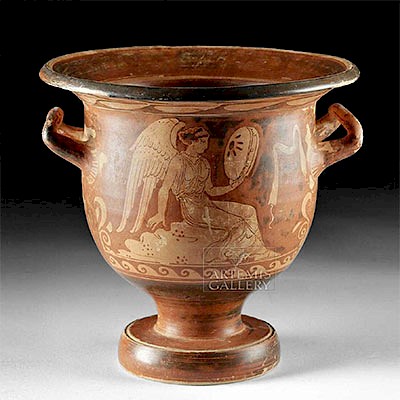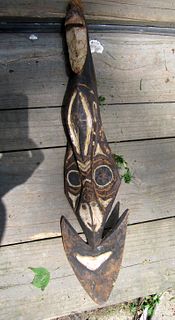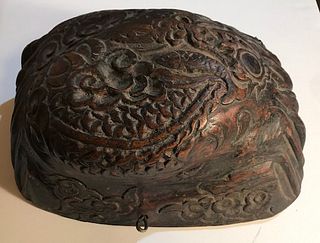19th C. Nepalese Painted Wood Festival Mask
Lot 138
About Seller
Artemis Gallery
686 S Taylor Ave, Ste 106
Louisville, CO 80027
United States
Selling antiquities, ancient and ethnographic art online since 1993, Artemis Gallery specializes in Classical Antiquities (Egyptian, Greek, Roman, Near Eastern), Asian, Pre-Columbian, African / Tribal / Oceanographic art. Our extensive inventory includes pottery, stone, metal, wood, glass and textil...Read more
Categories
Estimate:
$1,500 - $2,250
Absentee vs Live bid
Two ways to bid:
- Leave a max absentee bid and the platform will bid on your behalf up to your maximum bid during the live auction.
- Bid live during the auction and your bids will be submitted real-time to the auctioneer.
Bid Increments
| Price | Bid Increment |
|---|---|
| $0 | $25 |
| $300 | $50 |
| $1,000 | $100 |
| $2,000 | $250 |
| $5,000 | $500 |
| $10,000 | $1,000 |
| $20,000 | $2,500 |
| $50,000 | $5,000 |
| $100,000 | $10,000 |
| $200,000 | $20,000 |
About Auction
By Artemis Gallery
Mar 7, 2019
Set Reminder
2019-03-07 10:00:00
2019-03-07 10:00:00
America/New_York
Bidsquare
Bidsquare : VARIETY SALE | Antiquities & Ethnographic Art
https://www.bidsquare.com/auctions/artemis-gallery/variety-sale-antiquities-ethnographic-art-3928
Around the world & back in time - be amazed at the treasures you will find. Antiquities from Egypt, Greece, Italy and the Near East, Asian, Pre-Columbian, African / Tribal / Oceanic, Native American, Spanish Colonial, Russian Icons, Fine Art, much more! Artemis Gallery info@artemisgallery.com
Around the world & back in time - be amazed at the treasures you will find. Antiquities from Egypt, Greece, Italy and the Near East, Asian, Pre-Columbian, African / Tribal / Oceanic, Native American, Spanish Colonial, Russian Icons, Fine Art, much more! Artemis Gallery info@artemisgallery.com
- Lot Description
Central Asia, Himalayan Region, Nepal, ca. late 19th century CE. A beautiful and expressive festival mask, hand-carved from hard wood, with an elongated visage comprised of openwork eyes, a slender nose with drilled nostrils, and a grinning mouth with bared teeth; the temples are drilled for suspension. Areas of white, red, yellow, and brown pigment are visible across the obverse side, and faint traces of pink pigment surround the lips and mouth. A pair of nails are pierced through the lower cheeks, with one still holding the remnants of a mustache made of hair; a large goatee hangs from the chin in a similar fashion. The verso of the mask is carved out for wear. Custom museum-quality display stand included. Size: 5.75" W x 7.875" H (14.6 cm x 20 cm); 11.75" H (29.8 cm) on included custom stand.
The Himalayan masking tradition is not as well-known as those from Africa or Southeast Asia, and today some of the original information has been lost due to fading oral traditions. Masks like this example relate to indigenous, animist traditions that developed in the harsh, wild environments of the Himalayas, and so they are often representations of local spirits. They were made to be worn in masquerades, glimpsed through light from lamps burning butter as oil.
Compare similar examples in Chazot, Eric. "Himalayas: Art & Shamans." Paris, 2009.
Provenance: private New York, New York, USA collection; ex-Howard and Catherine Feldman collection, Santa Fe, New Mexico, USA
All items legal to buy/sell under U.S. Statute covering cultural patrimony Code 2600, CHAPTER 14, and are guaranteed to be as described or your money back.
A Certificate of Authenticity will accompany all winning bids.
We ship worldwide and handle all shipping in-house for your convenience.
#139419Loss to portion of top periphery. Small nicks and abrasions to eyes, nose, mouth, and peripheries, with fading to pigmentation, and loss to one side of mustache. Nice earthen deposits and traces of pigmentation throughout.Condition
- Shipping Info
-
All shipping is handled in-house for your convenience. Your invoice from Artemis Gallery will include shipping calculation instructions. If in doubt, please inquire BEFORE bidding for estimated shipping costs for individual items.
-
- Buyer's Premium



 EUR
EUR CAD
CAD AUD
AUD GBP
GBP MXN
MXN HKD
HKD CNY
CNY MYR
MYR SEK
SEK SGD
SGD CHF
CHF THB
THB














